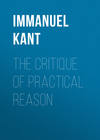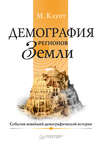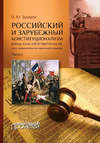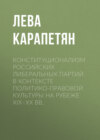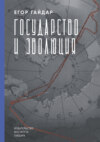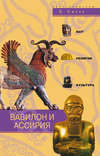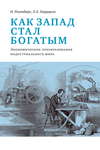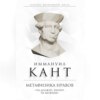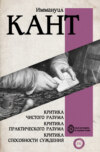Kitobni o'qish: «The Critique of Practical Reason»
PREFACE
This work is called the Critique of Practical Reason, not of the pure practical reason, although its parallelism with the speculative critique would seem to require the latter term. The reason of this appears sufficiently from the treatise itself. Its business is to show that there is pure practical reason, and for this purpose it criticizes the entire practical faculty of reason. If it succeeds in this, it has no need to criticize the pure faculty itself in order to see whether reason in making such a claim does not presumptuously overstep itself (as is the case with the speculative reason). For if, as pure reason, it is actually practical, it proves its own reality and that of its concepts by fact, and all disputation against the possibility of its being real is futile.
With this faculty, transcendental freedom is also established; freedom, namely, in that absolute sense in which speculative reason required it in its use of the concept of causality in order to escape the antinomy into which it inevitably falls, when in the chain of cause and effect it tries to think the unconditioned. Speculative reason could only exhibit this concept (of freedom) problematically as not impossible to thought, without assuring it any objective reality, and merely lest the supposed impossibility of what it must at least allow to be thinkable should endanger its very being and plunge it into an abyss of scepticism.
Inasmuch as the reality of the concept of freedom is proved by an apodeictic law of practical reason, it is the keystone of the whole system of pure reason, even the speculative, and all other concepts (those of God and immortality) which, as being mere ideas, remain in it unsupported, now attach themselves to this concept, and by it obtain consistence and objective reality; that is to say, their possibility is proved by the fact that freedom actually exists, for this idea is revealed by the moral law.
Freedom, however, is the only one of all the ideas of the speculative reason of which we know the possibility a priori (without, however, understanding it), because it is the condition of the moral law which we know. 1 The ideas of God and immortality, however, are not conditions of the moral law, but only conditions of the necessary object of a will determined by this law; that is to say, conditions of the practical use of our pure reason. Hence, with respect to these ideas, we cannot affirm that we know and understand, I will not say the actuality, but even the possibility of them. However they are the conditions of the application of the morally determined will to its object, which is given to it a priori, viz., the summum bonum. Consequently in this practical point of view their possibility must be assumed, although we cannot theoretically know and understand it. To justify this assumption it is sufficient, in a practical point of view, that they contain no intrinsic impossibility (contradiction). Here we have what, as far as speculative reason is concerned, is a merely subjective principle of assent, which, however, is objectively valid for a reason equally pure but practical, and this principle, by means of the concept of freedom, assures objective reality and authority to the ideas of God and immortality. Nay, there is a subjective necessity (a need of pure reason) to assume them. Nevertheless the theoretical knowledge of reason is not hereby enlarged, but only the possibility is given, which heretofore was merely a problem and now becomes assertion, and thus the practical use of reason is connected with the elements of theoretical reason. And this need is not a merely hypothetical one for the arbitrary purposes of speculation, that we must assume something if we wish in speculation to carry reason to its utmost limits, but it is a need which has the force of law to assume something without which that cannot be which we must inevitably set before us as the aim of our action.
{PREFACE ^paragraph 5}
It would certainly be more satisfactory to our speculative reason if it could solve these problems for itself without this circuit and preserve the solution for practical use as a thing to be referred to, but in fact our faculty of speculation is not so well provided. Those who boast of such high knowledge ought not to keep it back, but to exhibit it publicly that it may be tested and appreciated. They want to prove: very good, let them prove; and the critical philosophy lays its arms at their feet as the victors. Quid statis? Nolint. Atqui licet esse beatis. As they then do not in fact choose to do so, probably because they cannot, we must take up these arms again in order to seek in the mortal use of reason, and to base on this, the notions of God, freedom, and immortality, the possibility of which speculation cannot adequately prove.
Here first is explained the enigma of the critical philosophy, viz.: how we deny objective reality to the supersensible use of the categories in speculation and yet admit this reality with respect to the objects of pure practical reason. This must at first seem inconsistent as long as this practical use is only nominally known. But when, by a thorough analysis of it, one becomes aware that the reality spoken of does not imply any theoretical determination of the categories and extension of our knowledge to the supersensible; but that what is meant is that in this respect an object belongs to them, because either they are contained in the necessary determination of the will a priori, or are inseparably connected with its object; then this inconsistency disappears, because the use we make of these concepts is different from what speculative reason requires. On the other hand, there now appears an unexpected and very satisfactory proof of the consistency of the speculative critical philosophy. For whereas it insisted that the objects of experience as such, including our own subject, have only the value of phenomena, while at the same time things in themselves must be supposed as their basis, so that not everything supersensible was to be regarded as a fiction and its concept as empty; so now practical reason itself, without any concert with the speculative, assures reality to a supersensible object of the category of causality, viz., freedom, although (as becomes a practical concept) only for practical use; and this establishes on the evidence of a fact that which in the former case could only be conceived. By this the strange but certain doctrine of the speculative critical philosophy, that the thinking subject is to itself in internal intuition only a phenomenon, obtains in the critical examination of the practical reason its full confirmation, and that so thoroughly that we should be compelled to adopt this doctrine, even if the former had never proved it at all. 2
{PREFACE ^paragraph 10}
By this also I can understand why the most considerable objections which I have as yet met with against the Critique turn about these two points, namely, on the one side, the objective reality of the categories as applied to noumena, which is in the theoretical department of knowledge denied, in the practical affirmed; and on the other side, the paradoxical demand to regard oneself qua subject of freedom as a noumenon, and at the same time from the point of view of physical nature as a phenomenon in one's own empirical consciousness; for as long as one has formed no definite notions of morality and freedom, one could not conjecture on the one side what was intended to be the noumenon, the basis of the alleged phenomenon, and on the other side it seemed doubtful whether it was at all possible to form any notion of it, seeing that we had previously assigned all the notions of the pure understanding in its theoretical use exclusively to phenomena. Nothing but a detailed criticism of the practical reason can remove all this misapprehension and set in a clear light the consistency which constitutes its greatest merit.
So much by way of justification of the proceeding by which, in this work, the notions and principles of pure speculative reason which have already undergone their special critical examination are, now and then, again subjected to examination. This would not in other cases be in accordance with the systematic process by which a science is established, since matters which have been decided ought only to be cited and not again discussed. In this case, however, it was not only allowable but necessary, because reason is here considered in transition to a different use of these concepts from what it had made of them before. Such a transition necessitates a comparison of the old and the new usage, in order to distinguish well the new path from the old one and, at the same time, to allow their connection to be observed. Accordingly considerations of this kind, including those which are once more directed to the concept of freedom in the practical use of the pure reason, must not be regarded as an interpolation serving only to fill up the gaps in the critical system of speculative reason (for this is for its own purpose complete), or like the props and buttresses which in a hastily constructed building are often added afterwards; but as true members which make the connexion of the system plain, and show us concepts, here presented as real, which there could only be presented problematically. This remark applies especially to the concept of freedom, respecting which one cannot but observe with surprise that so many boast of being able to understand it quite well and to explain its possibility, while they regard it only psychologically, whereas if they had studied it in a transcendental point of view, they must have recognized that it is not only indispensable as a problematical concept, in the complete use of speculative reason, but also quite incomprehensible; and if they afterwards came to consider its practical use, they must needs have come to the very mode of determining the principles of this, to which they are now so loth to assent. The concept of freedom is the stone of stumbling for all empiricists, but at the same time the key to the loftiest practical principles for critical moralists, who perceive by its means that they must necessarily proceed by a rational method. For this reason I beg the reader not to pass lightly over what is said of this concept at the end of the Analytic.
I must leave it to those who are acquainted with works of this kind to judge whether such a system as that of the practical reason, which is here developed from the critical examination of it, has cost much or little trouble, especially in seeking not to miss the true point of view from which the whole can be rightly sketched. It presupposes, indeed, the Fundamental Principles of the Metaphysic of Morals, but only in so far as this gives a preliminary acquaintance with the principle of duty, and assigns and justifies a definite formula thereof; in other respects it is independent. 3 It results from the nature of this practical faculty itself that the complete classification of all practical sciences cannot be added, as in the critique of the speculative reason. For it is not possible to define duties specially, as human duties, with a view to their classification, until the subject of this definition (viz., man) is known according to his actual nature, at least so far as is necessary with respect to duty; this, however, does not belong to a critical examination of the practical reason, the business of which is only to assign in a complete manner the principles of its possibility, extent, and limits, without special reference to human nature. The classification then belongs to the system of science, not to the system of criticism.
{PREFACE ^paragraph 15}
In the second part of the Analytic I have given, as I trust, a sufficient answer to the objection of a truth-loving and acute critic 4 of the Fundamental Principles of the Metaphysic of Morals- a critic always worthy of respect- the objection, namely, that the notion of good was not established before the moral principle, as he thinks it ought to have been. 5(2) I have also had regard to many of the objections which have reached me from men who show that they have at heart the discovery of the truth, and I shall continue to do so (for those who have only their old system before their eyes, and who have already settled what is to be approved or disapproved, do not desire any explanation which might stand in the way of their own private opinion.)
{PREFACE ^paragraph 20}
When we have to study a particular faculty of the human mind in its sources, its content, and its limits; then from the nature of human knowledge we must begin with its parts, with an accurate and complete exposition of them; complete, namely, so far as is possible in the present state of our knowledge of its elements. But there is another thing to be attended to which is of a more philosophical and architectonic character, namely, to grasp correctly the idea of the whole, and from thence to get a view of all those parts as mutually related by the aid of pure reason, and by means of their derivation from the concept of the whole. This is only possible through the most intimate acquaintance with the system; and those who find the first inquiry too troublesome, and do not think it worth their while to attain such an acquaintance, cannot reach the second stage, namely, the general view, which is a synthetical return to that which had previously been given analytically. It is no wonder then if they find inconsistencies everywhere, although the gaps which these indicate are not in the system itself, but in their own incoherent train of thought.
I have no fear, as regards this treatise, of the reproach that I wish to introduce a new language, since the sort of knowledge here in question has itself somewhat of an everyday character. Nor even in the case of the former critique could this reproach occur to anyone who had thought it through and not merely turned over the leaves. To invent new words where the language has no lack of expressions for given notions is a childish effort to distinguish oneself from the crowd, if not by new and true thoughts, yet by new patches on the old garment. If, therefore, the readers of that work know any more familiar expressions which are as suitable to the thought as those seem to me to be, or if they think they can show the futility of these thoughts themselves and hence that of the expression, they would, in the first case, very much oblige me, for I only desire to be understood: and, in the second case, they would deserve well of philosophy. But, as long as these thoughts stand, I very much doubt that suitable and yet more common expressions for them can be found. 6
{PREFACE ^paragraph 25}
In this manner, then, the a priori principles of two faculties of the mind, the faculty of cognition and that of desire, would be found and determined as to the conditions, extent, and limits of their use, and thus a sure foundation be paid for a scientific system of philosophy, both theoretic and practical.
Nothing worse could happen to these labours than that anyone should make the unexpected discovery that there neither is, nor can be, any a priori knowledge at all. But there is no danger of this. This would be the same thing as if one sought to prove by reason that there is no reason. For we only say that we know something by reason, when we are conscious that we could have known it, even if it had not been given to us in experience; hence rational knowledge and knowledge a priori are one and the same. It is a clear contradiction to try to extract necessity from a principle of experience (ex pumice aquam), and to try by this to give a judgement true universality (without which there is no rational inference, not even inference from analogy, which is at least a presumed universality and objective necessity). To substitute subjective necessity, that is, custom, for objective, which exists only in a priori judgements, is to deny to reason the power of judging about the object, i.e., of knowing it, and what belongs to it. It implies, for example, that we must not say of something which often or always follows a certain antecedent state that we can conclude from this to that (for this would imply objective necessity and the notion of an a priori connexion), but only that we may expect similar cases (just as animals do), that is that we reject the notion of cause altogether as false and a mere delusion. As to attempting to remedy this want of objective and consequently universal validity by saying that we can see no ground for attributing any other sort of knowledge to other rational beings, if this reasoning were valid, our ignorance would do more for the enlargement of our knowledge than all our meditation. For, then, on this very ground that we have no knowledge of any other rational beings besides man, we should have a right to suppose them to be of the same nature as we know ourselves to be: that is, we should really know them. I omit to mention that universal assent does not prove the objective validity of a judgement (i.e., its validity as a cognition), and although this universal assent should accidentally happen, it could furnish no proof of agreement with the object; on the contrary, it is the objective validity which alone constitutes the basis of a necessary universal consent.
{PREFACE ^paragraph 30}
Hume would be quite satisfied with this system of universal empiricism, for, as is well known, he desired nothing more than that, instead of ascribing any objective meaning to the necessity in the concept of cause, a merely subjective one should be assumed, viz., custom, in order to deny that reason could judge about God, freedom, and immortality; and if once his principles were granted, he was certainly well able to deduce his conclusions therefrom, with all logical coherence. But even Hume did not make his empiricism so universal as to include mathematics. He holds the principles of mathematics to be analytical; and if his were correct, they would certainly be apodeictic also: but we could not infer from this that reason has the faculty of forming apodeictic judgements in philosophy also- that is to say, those which are synthetical judgements, like the judgement of causality. But if we adopt a universal empiricism, then mathematics will be included.
Now if this science is in contradiction with a reason that admits only empirical principles, as it inevitably is in the antinomy in which mathematics prove the infinite divisibility of space, which empiricism cannot admit; then the greatest possible evidence of demonstration is in manifest contradiction with the alleged conclusions from experience, and we are driven to ask, like Cheselden's blind patient, "Which deceives me, sight or touch?" (for empiricism is based on a necessity felt, rationalism on a necessity seen). And thus universal empiricism reveals itself as absolute scepticism. It is erroneous to attribute this in such an unqualified sense to Hume, 7 since he left at least one certain touchstone (which can only be found in a priori principles), although experience consists not only of feelings, but also of judgements.
{PREFACE ^paragraph 35}
However, as in this philosophical and critical age such empiricism can scarcely be serious, and it is probably put forward only as an intellectual exercise and for the purpose of putting in a clearer light, by contrast, the necessity of rational a priori principles, we can only be grateful to those who employ themselves in this otherwise uninstructive labour.
INTRODUCTION
INTRODUCTION
Of the Idea of a Critique of Practical Reason.
The theoretical use of reason was concerned with objects of the cognitive faculty only, and a critical examination of it with reference to this use applied properly only to the pure faculty of cognition; because this raised the suspicion, which was afterwards confirmed, that it might easily pass beyond its limits, and be lost among unattainable objects, or even contradictory notions. It is quite different with the practical use of reason. In this, reason is concerned with the grounds of determination of the will, which is a faculty either to produce objects corresponding to ideas, or to determine ourselves to the effecting of such objects (whether the physical power is sufficient or not); that is, to determine our causality. For here, reason can at least attain so far as to determine the will, and has always objective reality in so far as it is the volition only that is in question. The first question here then is whether pure reason of itself alone suffices to determine the will, or whether it can be a ground of determination only as dependent on empirical conditions. Now, here there comes in a notion of causality justified by the critique of the pure reason, although not capable of being presented empirically, viz., that of freedom; and if we can now discover means of proving that this property does in fact belong to the human will (and so to the will of all rational beings), then it will not only be shown that pure reason can be practical, but that it alone, and not reason empirically limited, is indubitably practical; consequently, we shall have to make a critical examination, not of pure practical reason, but only of practical reason generally. For when once pure reason is shown to exist, it needs no critical examination. For reason itself contains the standard for the critical examination of every use of it. The critique, then, of practical reason generally is bound to prevent the empirically conditioned reason from claiming exclusively to furnish the ground of determination of the will. If it is proved that there is a [practical] reason, its employment is alone immanent; the empirically conditioned use, which claims supremacy, is on the contrary transcendent and expresses itself in demands and precepts which go quite beyond its sphere. This is just the opposite of what might be said of pure reason in its speculative employment.
However, as it is still pure reason, the knowledge of which is here the foundation of its practical employment, the general outline of the classification of a critique of practical reason must be arranged in accordance with that of the speculative. We must, then, have the Elements and the Methodology of it; and in the former an Analytic as the rule of truth, and a Dialectic as the exposition and dissolution of the illusion in the judgements of practical reason. But the order in the subdivision of the Analytic will be the reverse of that in the critique of the pure speculative reason. For, in the present case, we shall commence with the principles and proceed to the concepts, and only then, if possible, to the senses; whereas in the case of the speculative reason we began with the senses and had to end with the principles. The reason of this lies again in this: that now we have to do with a will, and have to consider reason, not in its relation to objects, but to this will and its causality. We must, then, begin with the principles of a causality not empirically conditioned, after which the attempt can be made to establish our notions of the determining grounds of such a will, of their application to objects, and finally to the subject and its sense faculty. We necessarily begin with the law of causality from freedom, that is, with a pure practical principle, and this determines the objects to which alone it can be applied.
